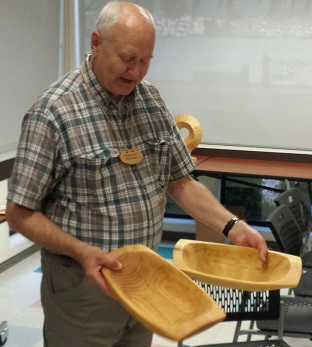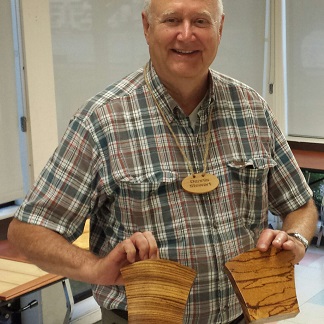Newsletter July 2019
Presidents Message
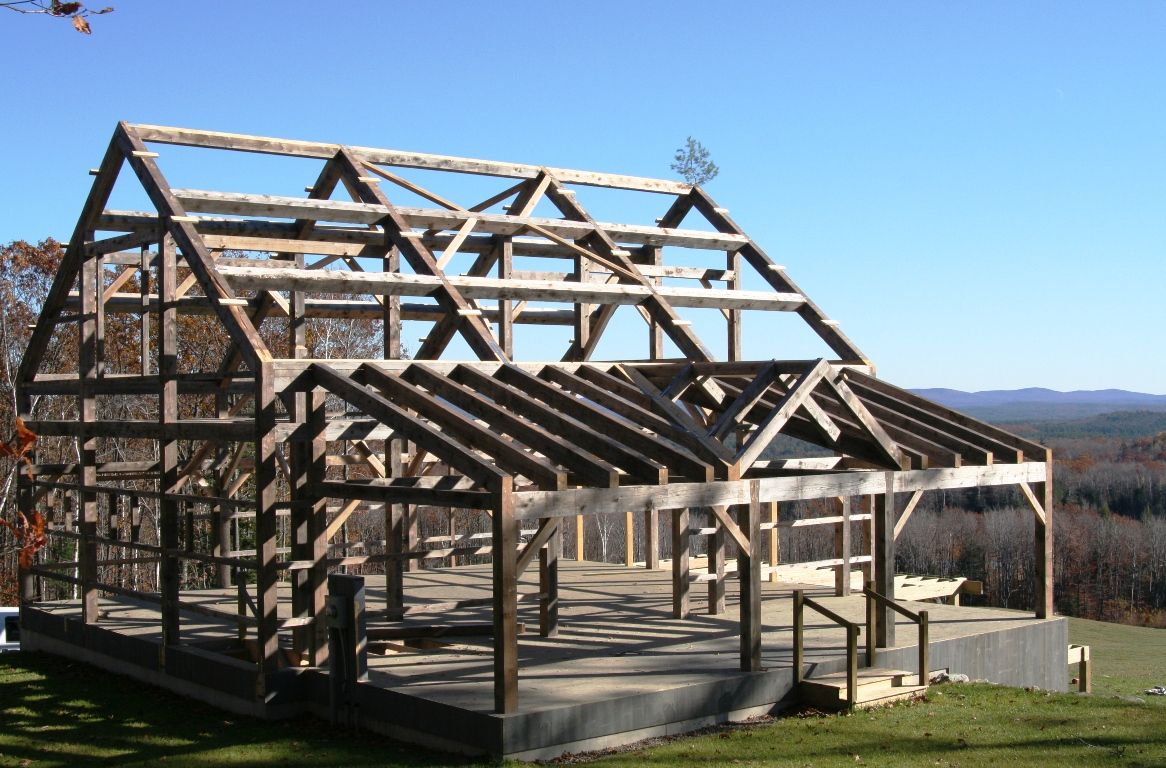
Facebook has many groups that I find interesting to scan through.
My recent favorites have included: "Unplugged Woodworkers", (over 30K members) which focuses on not using power tools, and "Benchtop Metal Lathes", which has over 4.5K members.
My group of the moment is "Historical Timber Framing, Traditional Building and Architecture", which has nearly 7K members. The members publish pictures, comments and occasional requests for help on wooden framed structures that are being made, restored, moved (or sometimes just being enjoyed). Typically the structures are houses, barns, halls and the occasional bridge, etc.. One of my recent favorites was a series of pictures taken by someone studying the roofing beams in Winchester Cathedral – the post was a few weeks ago but I cannot find my way back to it as I cannot remember the name of the person who posted it.
The problem I have with these posts is; are they useful or are they just a modern day coffee table book - or even would they be more useful if they were just published as a coffee table book?
If a group had 6000 members and they each make just one post a year that would be 17 new posts every day just from that group. Generally interesting posts are those that generate a few comments adding to the data you have to read through.
The nature of posts is they are not stored in any structured way so it is hard to go back and find something even a few weeks later. Posts appear to exist only in their own moment in time.
At least with a good coffee table book you can go back and look at the structure of old barns.
The instant nature of Facebook does not replace the needs for well constructed and presented knowledge, plus reading it can burn up a lot of your day.
Enjoy your woodwork Frank (Contact at: Frankramsay8@aol.com)
Top
Last Meeting
Frank called the meeting to order at 6:15.
Announcements:
Frank announced the upcoming visit to Urban Moose Timber & Design on Sunday, July 14.
The event is free. Members should have received an Eventbright email invitation, if you did not receive one please let me know.
Upcoming Meetings:
July 21st: Tom Gaston: Carving
August 18th: Tom Vogel: Kumiko Zaiku
September 15th: Dennis Sullivan presenting on architecture with a focus on how /where wood is being used.
Top
Featured Speaker: Jamie Buxton
Special Show and Tell: Building a fancy bathroom unit
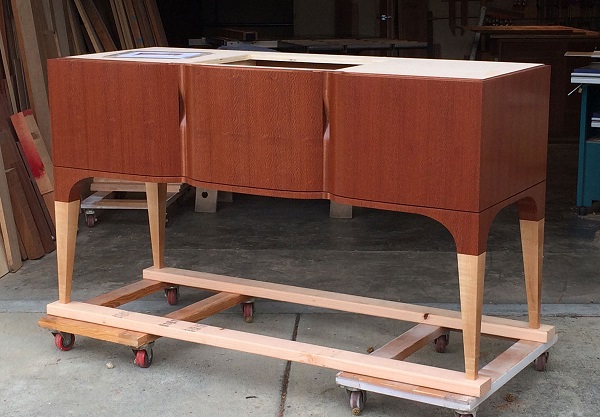
Jamie Buxton built a 6 foot wide vanity for an undisclosed client. It has a marble top with a sink in the middle.
He created the vanity in Sketchup based on a photo provided by the client. Jamie delivered the vanity without the marble top and sink. The vanity has a 3 panel curved front - a fixed center panel and two doors. He made two plywood forms using router templates. The panels are made of lacewood veneer laminated to plywood that he shaped over the forms. He used Italian bending ply, 5 layers thick, to create the panels. He used epoxy to glue the plys together and vacuum bagged them over the plywood forms. Then he cut and glued edge banding before vacuum bagging the veneers. He cut his lacewood veneers about .08 inch thick. The edge banding is thick enough to allow any size adjustments to be made - including removal of excess epoxy.
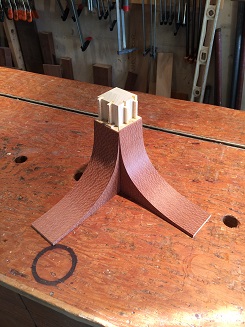
Interface between top of leg and cabinet (upside down)
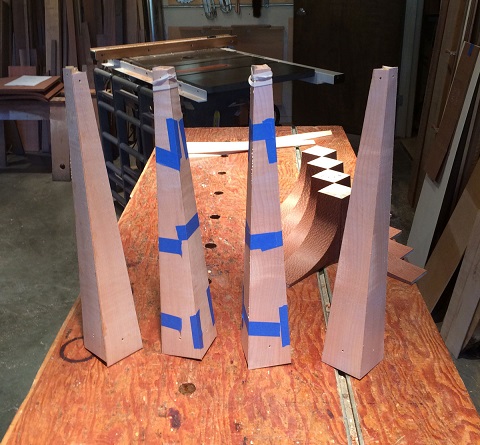
Legs sections being glued together
The tapered maple legs are actually 3/16" thick Western maple laminated to poplar and simply mitered and glued.
Top
2 x 4 Challenge
Jon Kaplan's heart shaped 2x4 sculpture consisting of many compound angled pieces.
Clamping for gluing was a challenge eventually solved with the sided of 2 sided sticky tape
Ken Napior showed 3 turned candlesticks,
one turned candy bowl on a hand carved spiral pedestal,
two duck calls, a redwood crater, and a thumb drum with two drum sticks.
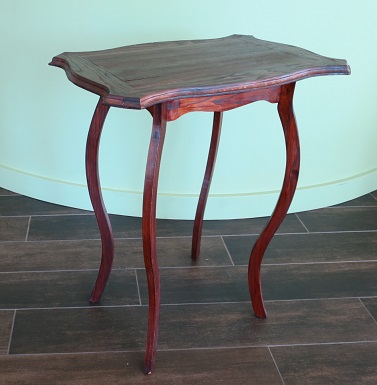
Frank showed off his twenty year old occasional table that is still in use today.
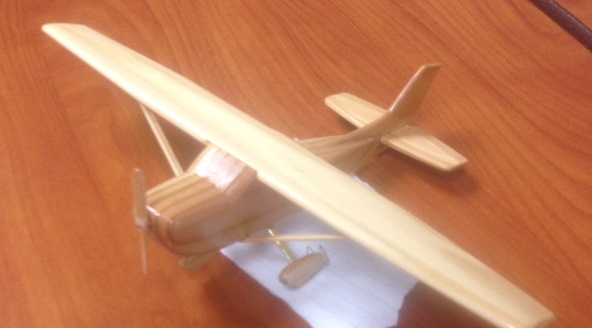
Burt showed up with another small model airplane - the Cessna 172.
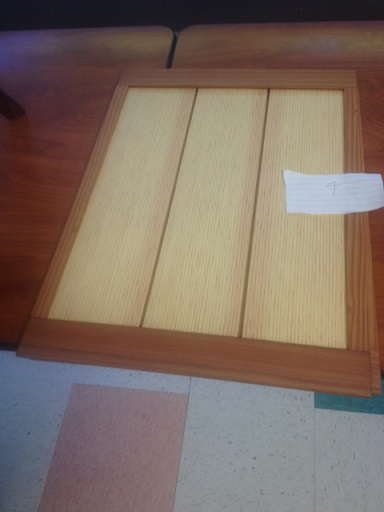
John Blackmore showed his wood place mats, though he was not present at the meeting.
Top
Show and Tell
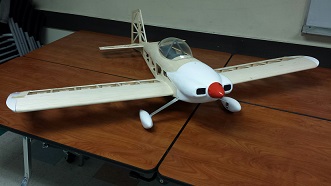
Burt brought in his radio controlled model airplane - a Vans RV-4 he made from a balsa and
plywood kit.
He mentioned that is has yet to be covered with an iron-on polyester film.
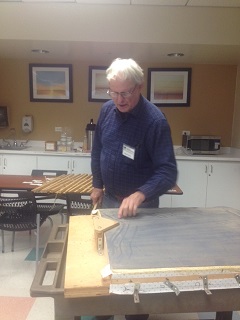
Bruce Powell showed his bending jig he made for slightly curved doors.
He was willing to lend it to anyone
who might want to use it.
He also brought in some pegboard he was hoping to give away.
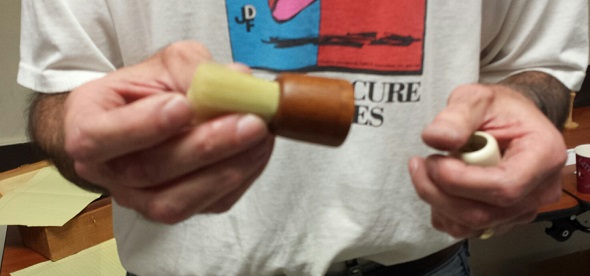
Jon Kaplan showed a mahogany shaving brush he made for a friend.
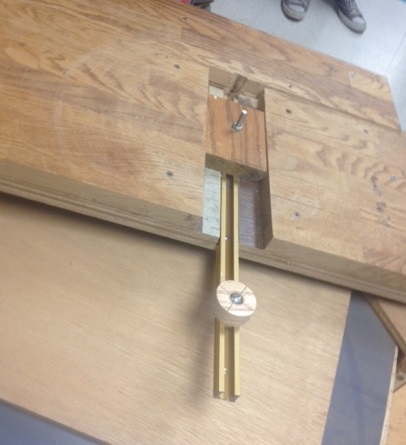
Ken Napior showed us his circle cutting jig that works with his bandsaw. He also brought in a mahogany veneer framed mirror.
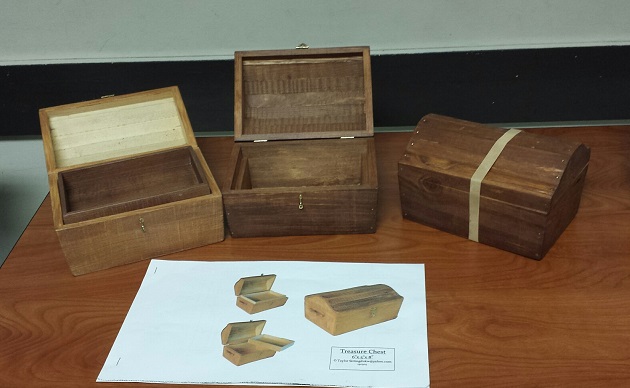
Harry brought in 3 mini chests for the toy workshop. He hopes to make at least 40 of them during the toy workshop.
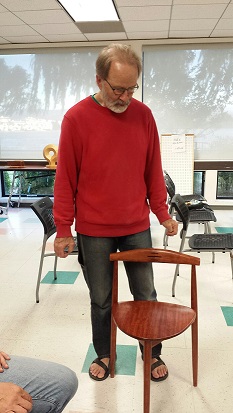
Jamie showed us his 3 legged dining chair made of bubinga with ebony accents.
It has turned legs and all curved
surfaces except for the supporting structure that is hidden underneath.
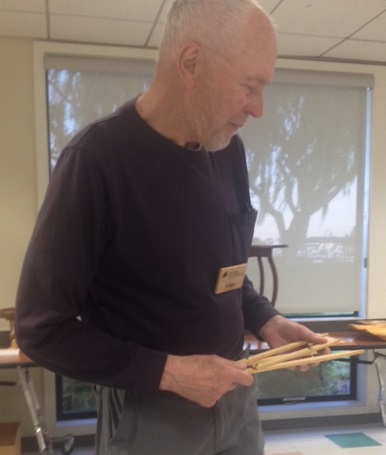
Per Madsen showed his ten year old baltic birch plywood box made using the Golden Ratio for its proportions
and a gauge that shows the Golden Ratio.
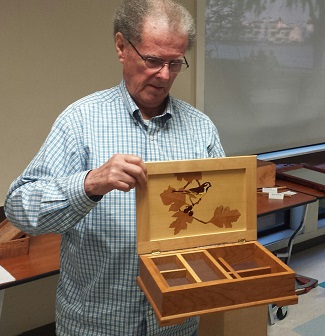
John Wilson brought in his inlaid jewelry box made from walnut and cherry.
